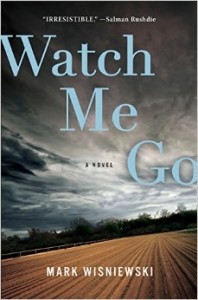Literary Risk
 Why did I work on Watch Me Go for twenty years? That’s not an easy question for me, if for no other reason than sometimes the book sat, rejected by yet another agent whose response had been full of praise and no substantive reason for turning it down. And for a number of years, the book sat after an agent had taken it on, found an eager acquiring editor at a major house–only to have that house’s publisher pass for reasons that caused the editor to state (in writing!) that if this novel went unpublished, he’d have an “existential crisis.”
Why did I work on Watch Me Go for twenty years? That’s not an easy question for me, if for no other reason than sometimes the book sat, rejected by yet another agent whose response had been full of praise and no substantive reason for turning it down. And for a number of years, the book sat after an agent had taken it on, found an eager acquiring editor at a major house–only to have that house’s publisher pass for reasons that caused the editor to state (in writing!) that if this novel went unpublished, he’d have an “existential crisis.”
So it’s certainly true that the longer Watch Me Go went without finding a home in print, the more I concluded that what was keeping it from readers’ eyes was fear. Some agents and editors and publishers were fearful of the story’s darkness and challenging portrayal of the tattered American dream. And some were fearful of the flak they might take if they’d publish stark dialogue about American ugliness regarding media-hyped hatreds, gun violence, and a less-than-scrupulous justice system.
 But there was also me, the writer, the conceiver, the plot-twister, the line-editor, who, at some point during Watch Me Go’s twenty-some-year incubation period, had begun to allow these gatekeepers’ fears to choke the voice and heart out of the book. In other words, I’d become fearful, at some point in my “maturation” as a writer, of all the fear in publishing, and as a result I’d softened the book too many times, for too many people, for far too many of the wrong reasons.
But there was also me, the writer, the conceiver, the plot-twister, the line-editor, who, at some point during Watch Me Go’s twenty-some-year incubation period, had begun to allow these gatekeepers’ fears to choke the voice and heart out of the book. In other words, I’d become fearful, at some point in my “maturation” as a writer, of all the fear in publishing, and as a result I’d softened the book too many times, for too many people, for far too many of the wrong reasons.
Of course I’d figured this softening needed to occur in order for the book to see daylight. But I’d been wrong. And it wasn’t until I told myself to stop blaming others for their fears–and to examine my own fears–and then to set them aside so I could revise Deesh and Jan’s story as fully and realistically as I could, that the book was snatched up by an agent and sold at auction to Penguin Putnam.
I guess what Watch Me Go has taught me, then, is that no one in publishing—no writer or editor or publisher, regardless of how threatened any of us might feel by possibilities such as job loss, economic depravity, depleted respect among peers, loneliness, and emotional pain from failure—should surrender without finally giving one last earnest, lay-it-all-on-the-line effort. Yes, what I’m talking about here is gambling, no doubt about it. But I’d be remiss if I didn’t tell you that when gambling meets courage, a kind of magic can happen.


